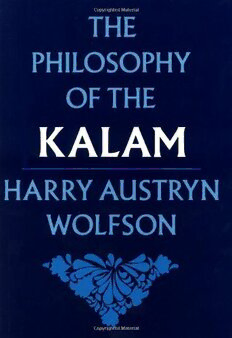Download The Philosophy of the Kalam PDF Free - Full Version
Download The Philosophy of the Kalam by Harry Austryn Wolfson in PDF format completely FREE. No registration required, no payment needed. Get instant access to this valuable resource on PDFdrive.to!
About The Philosophy of the Kalam
In this long-awaited volume, on which he worked for twenty years, Mr. Wolfson describes the body of doctrine known as the Kalam. Kalam, an Arabic term meaning ''speech'' and hence ''discussion,'' was applied to early attempts in Islam to adduce philosophic proofs for religious beliefs. It later came to designate a system of religious philosophy which reached its highest point in the eleventh century; the masters of Kalam, known as Mutakallimun, were in many respects the Muslim equivalent of the Christian Church Fathers. Mr. Wolfson studies the Kalam systematically, unfolding its philosophic origins and implications and observing its repercussions in other religions. He scrutinizes the texts of Muslim writers for their treatment of such crucial problems as the attributes of God, the Creation, causality, predestination and free will. In the process he shows how the teachings of the Koran were constantly interwoven with ideas from Greek and Oriental philosophies, Judaism, and Christianity as Islamic thought developed. As lucidly written and intellectually stimulating as all the author's earlier books, this volume is a fitting capstone to a notable career. Harry Wolfson spent sixty-six years at Harvard University, as undergraduate, graduate student, teacher, and professor emeritus. From 1925 until his retirement in 1958 he was Nathan Littauer Professor of Hebrew Literature and Philosophy at Harvard. He died in September 1974 at the age of 86. The Philosophy of the Kalam is the last major work of one of the great scholars of our age. Harry Wolfson was renowned throughout the world for the depth, scope, and wisdom of his monumental volumes on the structure and growth of philosophic systems from Plato to Spinoza. It was not only his extraordinary erudition that commanded respect, his awesome mastery of all the primary sources, Greek, Christian, Judaic, and Muslim; it was also his penetrating insight and his original and groundbreaking interpretations.
Detailed Information
| Author: | Harry Austryn Wolfson |
|---|---|
| Publication Year: | 1976 |
| ISBN: | 9780674665804 |
| Pages: | 404 |
| Language: | English |
| File Size: | 39.025 |
| Format: | |
| Price: | FREE |
Safe & Secure Download - No registration required
Why Choose PDFdrive for Your Free The Philosophy of the Kalam Download?
- 100% Free: No hidden fees or subscriptions required for one book every day.
- No Registration: Immediate access is available without creating accounts for one book every day.
- Safe and Secure: Clean downloads without malware or viruses
- Multiple Formats: PDF, MOBI, Mpub,... optimized for all devices
- Educational Resource: Supporting knowledge sharing and learning
Frequently Asked Questions
Is it really free to download The Philosophy of the Kalam PDF?
Yes, on https://PDFdrive.to you can download The Philosophy of the Kalam by Harry Austryn Wolfson completely free. We don't require any payment, subscription, or registration to access this PDF file. For 3 books every day.
How can I read The Philosophy of the Kalam on my mobile device?
After downloading The Philosophy of the Kalam PDF, you can open it with any PDF reader app on your phone or tablet. We recommend using Adobe Acrobat Reader, Apple Books, or Google Play Books for the best reading experience.
Is this the full version of The Philosophy of the Kalam?
Yes, this is the complete PDF version of The Philosophy of the Kalam by Harry Austryn Wolfson. You will be able to read the entire content as in the printed version without missing any pages.
Is it legal to download The Philosophy of the Kalam PDF for free?
https://PDFdrive.to provides links to free educational resources available online. We do not store any files on our servers. Please be aware of copyright laws in your country before downloading.
The materials shared are intended for research, educational, and personal use in accordance with fair use principles.

